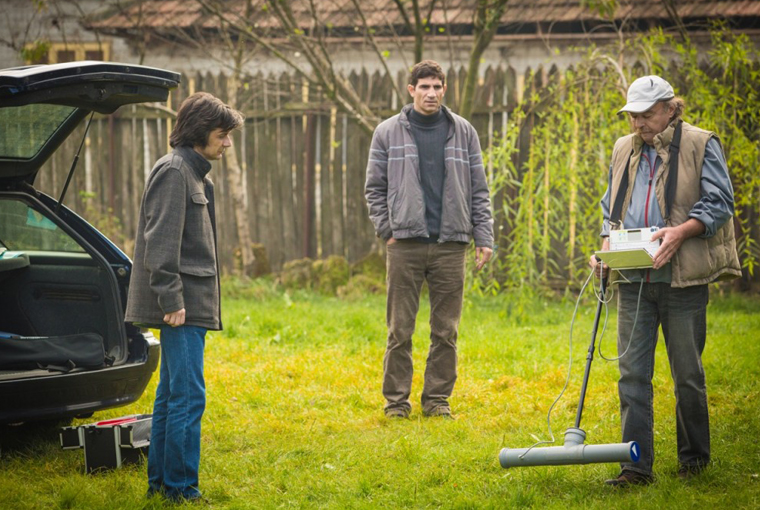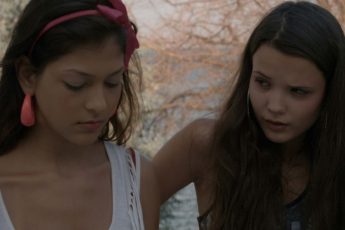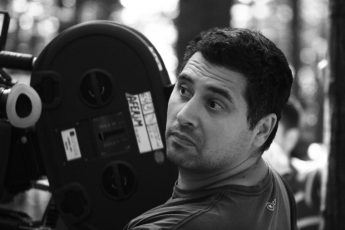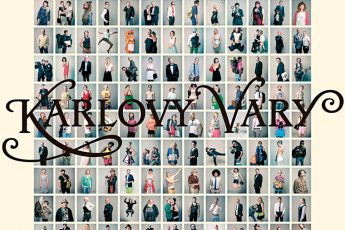All that Detail is Gold
Corneliu Porumboiu’s The Treasure (Comoara, 2015)
Vol. 55 (July 2015) by Moritz Pfeifer
In Corneliu Porumboiu’s new pic The Treasure, family guy Costi (Toma Cuzin) is pulled out of his cheerless professional and domestic routines when his bankrupt neighbor Adrian (Adrian Purcarescu) knocks on his door one evening with plans to go on a treasure hunt. The loot, so Adrian believes, is buried on the property of his grand-father, the heir of a wealthy Orthodox priest, on an estate outside Bucharest. The only rub: being debt-ridden, Adrian cannot afford to pay a pricey specialist with a metal detector to help him find the fortune. With Costi’s investment, he is willing to share 50/50. Reluctant at first, Costi agrees seizing the opportunity to impress his six-year old son and escape from what looks like a conjugal life of Chekhovian thrills.
This kind of action-adventure scenario is a first for a director well-known for his minimalist observations of, predominantly, middle-aged male control-freaks roaming in an ever-cloudy Romania of old-line traditions and institutional conformism. The Treasure, on the contrary, feels light in almost every way. The first couple of minutes could be those of a suspense flick, in which lengthy character studies make way for a rapid plot exposé. The essential thing to know about Costi is that he is a dreamer. Reading Robin Hood to his son as a bedtime story, one wonders whether Costi is his true audience himself.
So what kind of authoritarian bureaucrats could a treasure hunt disclose? More than you think. After all, this is Porumboiu, and fans will be delighted to discover the laws and orders Romanian fortune-hunters have to abide by. If Costi and Adrian find anything that could be considered national heritage in Adrian’s yard, they must immediately report it to the police and an expert committee will decide what will happen to the trove. Luckily though, deadpan metal-detecting specialist Cornel (superb acting by non-professional Corneliu Cozmei) agrees to keep his mouth shut for doing the job off the record (technically, even going to look for metal is an endeavor reserved for registered units who have to report to the public authority). But, for better or worse, Porumboiu spares us much of his mastery in portraying the tedious bickering that could result from such rules and regulations, leaving the fun to a few scenes. One scene at the local police station will be particularly appreciated by enthusiasts of Police, Adjective (2009).
The larger part of the movie could best be described as an outdoor chamber play with Costi, Adrian, and Cornel spending one day and half a night in the garden in search for Adrian’s buried inheritance. Here, they reveal their true characters. Costi slips more and more into his role of a dreamy boy scout who is in it for the fun more than the fortune. Adrian, on the other hand, only wants the money. Being indebted and unemployed, he has little to be proud of, hoping that the treasure will help him regain social prestige. Lastly, there is Cornel, the metal detector specialist, who simply wants to do his job properly and thoroughly. But Adrian’s greed grants little room for patience.
Meanwhile, Porumboiu explores the audiovisual particularity of searching for metal. A wide range of beeps provide the soundtrack of the search while some of the protagonists’ quarrels are rehearsed as voice-overs over computerized charts and 3D-graphics of soil provided by Cornel’s state-of-the-art tools. The director already developed an affinity for scientific imagery of this sort in his previous film, where he thought it adequate to show a full-length gastroscopy. In both films, the scientific images echo a certain obsession with truth Porumboiu’s characters often struggle with.
Indeed, as the search progresses well into the afternoon, Adrian threatens not to pay Cornel if his machines “lie” and then accuses the poor specialist of sabotaging the search, reasoning that he doesn’t have any incentive for doing his job right (ie. finding the treasure) since he will get paid no matter what. This self-righteous obstinacy becomes absurd when Adrian acts as if he were to gain more with having his distrust confirmed than with having Cornel finding the treasure. Does he give up the search at nightfall to prove that his suspicion about Cornel’s inadequate searching skills were true? Fortunately, Costi keeps digging…
It comes with quite a surprise, then, – attention: spoiler! – that the three men in The Treasure actually find what they were looking for instead of going home empty-handed by turning their search for the treasure into a power-play of who knows more about searching. This makes them differ from the three men in Porumboiu’s first feature, 12:08 East of Bucharest (2006), who tried to figure out whether the Romanian Revolution started in their home town, each stubbornly sticking to their own account to the point of losing the initial meaning of the question. In The Treasure, by contrast, the solidarity between the characters outweighs whatever they have to prove to each other. Costi goes so far that he even uses his share of the treasure to demonstrate to himself and to his son, that he, too, can be like Robin Hood.
Has Porumboiu sacrificed hyper-realist gloom for fairytale? No, for there is an insight that connects The Treasure to his earlier films. It tells us that truth, like wealth, should always be a means to and end, not an end in itself. For its own sake, truth, like wealth, can quickly turn into a self-serving dead-end.
What applies to the characters also applies to the film itself. The scientific images poke at Porumboiu’s own (and his fellow filmmakers’) obsession with truth and details. It is hard not to be reminded of the hyper-realism and fetish for detail the Romanian New Wave reared. Ten, fifteen years ago, when the New Wave started, it made sense to make films that discovered details that were barely visible. Films as hard scientific data countered ideology and a metaphorical way of seeing the world. If it were not for Cristi Puiu’s Cigarettes and Coffee (2004), perhaps people would still go around talking about coffee as if it were a form of currency or a way to identify with a globalized elite. The ‘job’ of the New Wave directors was to point to the facts: that coffee is first and foremost a brewed drink prepared from roasted coffee beans.
Today, this treasure-hunting for truth may divert from seeing the invisible. Even though the responsibility to do good can transform into perceptible actions, moral intentions are hardly visible to the eye. The emotional charge for Costi to represent the kind of role model for his son he reads about during his bedtime stories, for example, is hard to translate into a deed, and much harder to communicate. For all its details, Porumboiu’s new film does not refrain from painting a bigger picture. It may make use of lighter colors and more emotions, but it is as critically concerned with serious questions as were his earlier films. As East-German singer Wolf Bierman rightly observed: “one can only stay true to oneself through change.”




Leave a Comment